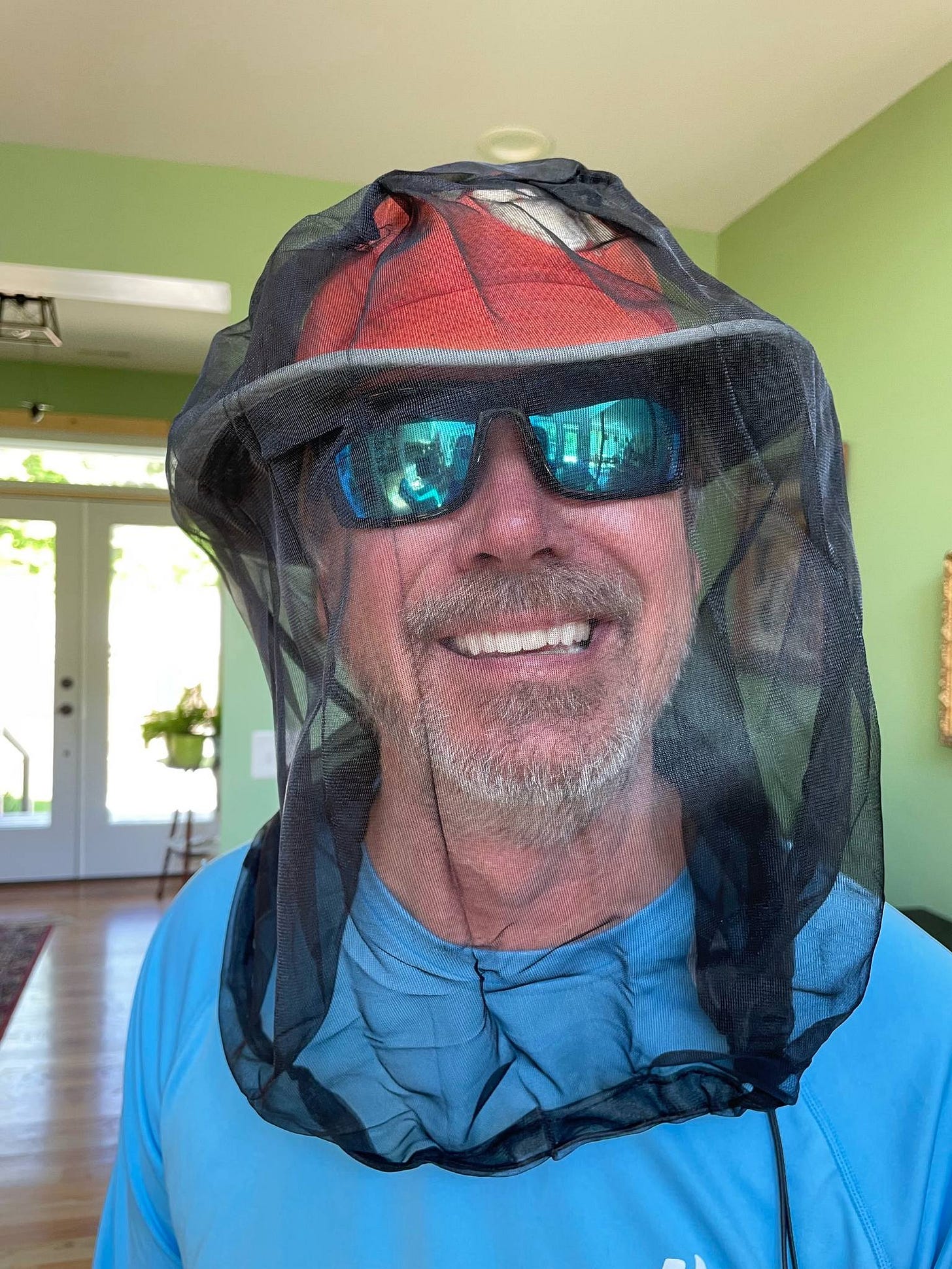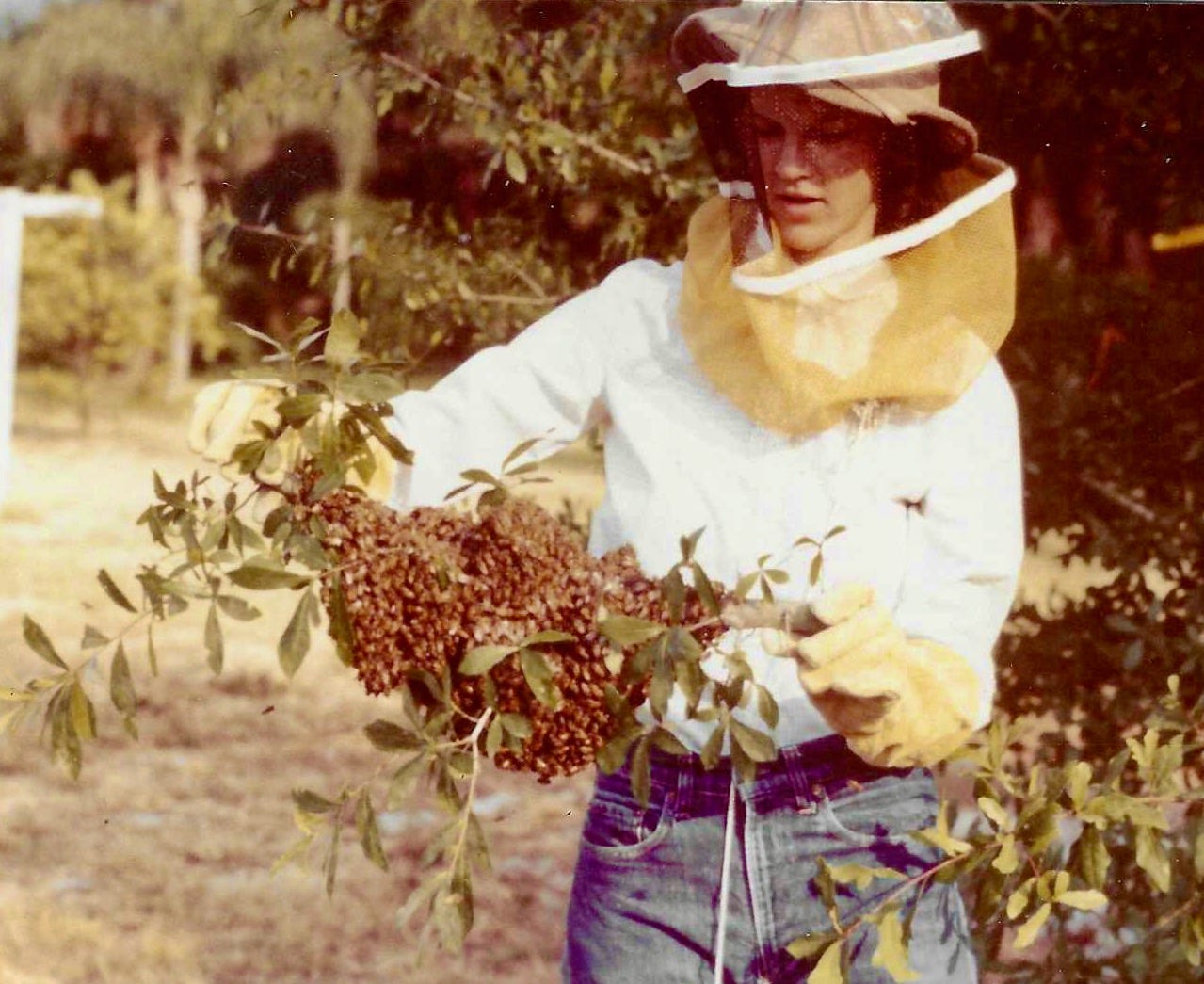Why are we so bugged by bugs?
They're just living their lives
Earlier today, my husband and I went for our usual summer morning walk in the woods.
Here he is, duly shrouded in his “gnat net,” a black veil that protects him from the millions of winged annoyances sent to bedevil his soul.
(I tried on one of these things once, at his urging. Instant claustrophobia. I couldn’t breathe.)
We set off on our walk early, to beat the heat. Already the morning air was humming with insect life. Pollinators, foragers, decomposers. All of them going about their important bug business. Doing their part to keep our biodiversity rich and complex. Bless them!
As we crossed the creek, something buzzed around my head in loopy circles. I couldn’t see what it was, only heard it.
“Good morning!” I thought. “How’s your day so far?”
I felt no urge to bat away my tiny visitor. Why would I? He/she was merely passing by. Exploring the vast universe of our woods. Curious about me, maybe—but bearing no ill will.
Man vs. Wasp
I’m well aware that not everyone reacts to insects this way. I’m married to one. (Not an insect! I mean I’m married to a bug-hater.)
More often than not, a pleasant porch sit with Jim is interrupted by a sudden explosion of jerky movements.
He’s swiping at the air. Springing from his chair. Muttering a curse.
An insect has penetrated Jim’s no-fly zone. Our peace shatters.
It’s a wasp. So I understand his frenzy. Wasps aren’t terribly friendly. Their sting can be unpleasant. Not wise to rile them.
“You’re just gonna make it mad,” I tell my husband, as he lunges toward the wasp, again and again. Don Quixote with a plastic swatter.
When Jim’s brain is in fight-or-flight, my pompous advice is pointless. I know that. I just can’t help myself.
“It won’t sting you if you leave it alone.”
His reply, fast and furious: “It needs to leave me alone!”
Poor Jim. He’s a good guy. A very good guy. But I’m outing him here as one of the millions of people who are bugged by bugs.
I understand. Really, I do. When an insect comes calling, a lot of us react violently. It’s a mixture of annoyance and sheer terror. Some kind of primitive survival instinct kicks in. We spring to action.
MUST … ELIMINATE … THIS … INVADER!
Some of us, though, manage to stay calm in the presence of winged creatures, even when they’re dive-bombing our face or scuttling across the kitchen floor.
Bees taught me calm
I think I learned steadiness around bugs during my beekeeping years. Working in close quarters with thousands of humming, crawling, flying insects will teach you equanimity.
You use a smoker, which keeps the bees placid and slightly confused. Even so, the minute you open a hive box and start pulling out honey-laden frames, your little charges are all over your hands and your arms. You’re wearing bee sleeves.
Early on, I learned that bees don’t sting unless they’re threatened. (Jim disputes this. It’s a theme of our most frequent argument.) If you move slowly, deliberately, mindfully, it’s quite possible to coexist with them in harmony.
Every once in awhile, our hives got overcrowded and the bees would swarm. Sometimes, unfortunately, into a neighbor’s yard.
(I was living in suburbia back then. The neighbors on the other side of our fence had a swimming pool. A pool that was often chock-full of kids. Bees like water. What else can I say?)
Whenever a swarm took off, we had to go fetch it. Sometimes that involved climbing a tree to snip a bee-covered branch. Here’s me, a young twentysomething showing off her bee calm.
Let me clarify that beekeepers do get stung. It goes with the job. Sometimes you make a move too suddenly. Or you brush the bees off a frame too roughly. And the bees express their displeasure. A beekeeper gets used to this. Once you’ve felt a bee sting— or dozens—you don’t dread it much.
At some point during my apiarist years, I developed an allergy to insect venom. This happens, evidently, in people with hyped-up immune systems. Histamine overload.
It can get serious
Which brings me to my next topic, really a disclaimer:
When I talk about people being annoyed by insects, I am most decidedly NOT talking about insects that carry life-threatening illnesses. Mosquitoes and ticks, to name only two. And I’m not talking about roaches, which are in a category all their own. I’m also of course sympathetic toward people who are deathly allergic to certain insect stings and bites. Please know that I understand the urgency of that. I understand the life-saving need to avoid those kinds of bugs. And/or kill them.
I found out about my allergy when trimming shrubbery one hot afternoon. A puss caterpillar fell out of a tree and onto the bony base of my neck, right at C-7.
Don’t know about puss caterpillars? Look ’em up. They’re the larval form of the Southern flannel moth, Megalopyge opercularis. A puss looks nothing like other caterpillars. No bright colors, no multiple pairs of legs, no antennae. Pusses are shaggy little blobs about an inch long and ranging from white to brown to orange-ish. If you saw one, it might remind you of a Star Trek Tribble. Or you might think it was a clump of hair you combed off your cat. (In fact, they’re also called the “toxic toupee” or—nowadays—the “Donald Trump caterpillar.” We can table that topic for another day.)
Pusses might look harmless—cute, almost—but they’re the No. 1 most venomous caterpillar in the U.S.
My instinctive reaction to the sting was to slap the creature off my neck.
It hurt like hell. I started panting. The sting site swelled up, hard and red, like a blood orange. Within five minutes, I couldn’t breathe very well. My throat felt like it was closing up. Anaphylaxis. Panic.
I ended up in the ER.
Not long after that, I was driving my truck one day with the windows open. A yellowjacket blew in, landed on the steering wheel, panicked when it found itself in a foreign land … and stung me on my index finger.
With nowhere for the venom to go, it pooled at the tip of the finger.
You probably know from your own painful experience how much a yellowjacket sting can hurt … and they aren’t a one-and-done insect like bees. Yellowjackets have a mean temper and a propensity for repeated jabs. People have died after stumbling on a nest of yellowjackets. You can’t outrun them.
I stopped the truck, shooed the insect out the window, then rocked back and forth, squeezing my finger in agony.
Next thing you know, I had a prescription for an EpiPen.
They’re everywhere
I could tell you other stories about ill-fated encounters with insects, past and present:
The voracious “lubberly locusts” that swarmed my hibiscus bushes when I lived in Florida. These flightless grasshoppers, enormous and neon yellow-orange, look like something out of an apocalypse movie. They can strip an entire hedge of its greenery in a day. I’m sorry to report that the only way to dispatch lubbers is to slice them in half with scissors. Which we did.
The 400-zillion mosquitoes that descended on our campsite in the Everglades one summer evening. It sounded like a fleet of Blackhawk helicopters roaring in. The air was black with them. Our camping trip ended abruptly.
The paper wasps that haunt our hummingbird feeders all summer long, here in the Blue Ridge Mountains. They must really crave that sugar water. They’re at it right now, outside the window as I type this. Drives Jim crazy. And I don’t think the hummers much like it, either.
What insects do for us
But here’s the thing: When insects are minding their own business, when we humans are not going after them in panicky hand-to-wing combat, when we’re not turning a brief encounter into all-out war, we can live peaceably with bugs.
For the most part, most of them are not out to get us. In fact, they’re quite intent on doing jobs that are vital to our existence.
Without insects:
Our food supply would be greatly diminished. (Vegetables? Fruits? Nuts? 35 percent of the food crops we eat depend on pollinating insects for reproduction.)
Our world would lose most of its bird species. (96 percent of songbirds raise their young on insects.)
Flowers would mostly disappear. (Three-fourths of the world’s flowering plants also depend on pollinators.)
We wouldn’t have healthy soil anymore. (Beetles and flies are adept decomposers.)
Our biosphere would suffer from lack of diversity. (Many insects predate on other insects, contributing to species balance.)
Insects are literally the living base of this complex ecological web we live in. We’re deeply dependent on them for our survival. And so many of them—bees, butterflies, moths, beetles—are endangered.
That’s the science of it.
Let’s all get along
For so many people, though, insects are an annoyance, something sent to disturb a picnic or a lake outing or a nice dinner. Bug-phobic humans take insect invaders seriously. They swat, they spray, they stomp, they squash.
Which makes me sad, to be honest.
Can’t we all just get along? Can’t we make peace with one simple fact? We Homo sapiens share this planet with a lot of other species. Species who are just trying to live out their lives, as we are.
Live on, little ones!
Let me leave you with a portrait of a bumblebee.
This little lady was exploring an echinacea in my wildflower meadow earlier this month. I watched her gathering pollen with her front legs, then stuffing that powdery gold into the tiny baskets on her hind legs. I heard her contented buzzing—on … off … on … off … on … off. She let me get quite close.
Consider this a tribute to all our fellow Earth-dwellers, especially the small winged ones. Long may they live and thrive.






I think bugs have the best personalities of the animal kingdom which I include humans in.
I love to watch as they go about their own business. I have saved many insects including a mosquito once to see if I could. As many know if a bee is worn out, often lil guy can be restored with honey water or sugar water or even water at times. I had one who I took outside with mixture so he could have a chance, and watched as he drank up. When finished the funniest thing happened, as getting his fill he flew to me a couple of feet away where I was watching, and flying in place a few seconds, looked squarely in my face as if to say "ty" or "wtf". I am not sure which. He was so cute and flew off happier than when I found him belly up, but not dead.
There is a lot of misinformation out there about mosquitoes and yes ticks. Wish we could educate especially those who resort to pest control companies. Thanks for speaking up for our best friends. Nothing makes me happier than the buzzing of pollinators as I’m working my garden early morning. And this for Jim, once I caught a wasp that had wandered into our home. I opened the door, uncapped the jar it was in and it flew back long enough to sting me then off to its freedom. Needless to say, I no longer rescue them when they’re trapped inside. All other insects yes. ( Did I know you were a beekeeper? We have been for over 12 years. I’m about ready to hang up the suit.)